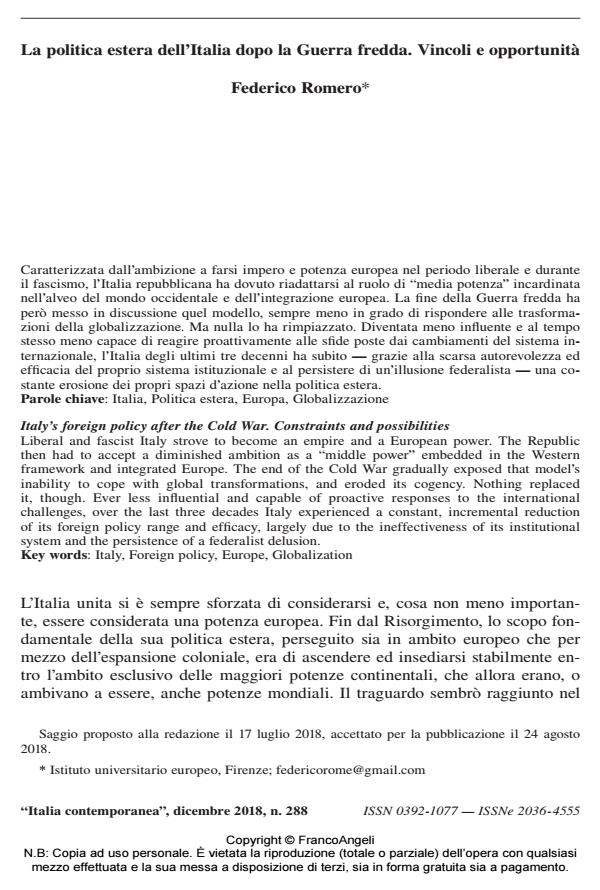La politica estera dell’Italia dopo la Guerra fredda. Vincoli e opportunità
Titolo Rivista ITALIA CONTEMPORANEA
Autori/Curatori Federico Romero
Anno di pubblicazione 2019 Fascicolo 2018/288
Lingua Italiano Numero pagine 13 P. 172-184 Dimensione file 111 KB
DOI 10.3280/IC2018-288008
Il DOI è il codice a barre della proprietà intellettuale: per saperne di più
clicca qui
Qui sotto puoi vedere in anteprima la prima pagina di questo articolo.
Se questo articolo ti interessa, lo puoi acquistare (e scaricare in formato pdf) seguendo le facili indicazioni per acquistare il download credit. Acquista Download Credits per scaricare questo Articolo in formato PDF

FrancoAngeli è membro della Publishers International Linking Association, Inc (PILA), associazione indipendente e non profit per facilitare (attraverso i servizi tecnologici implementati da CrossRef.org) l’accesso degli studiosi ai contenuti digitali nelle pubblicazioni professionali e scientifiche.
Caratterizzata dall’ambizione a farsi impero e potenza europea nel periodo liberale e durante il fascismo, l’Italia repubblicana ha dovuto riadattarsi al ruolo di "media potenza" incardinata nell’alveo del mondo occidentale e dell’integrazione europea. La fine della Guerra fredda ha però messo in discussione quel modello, sempre meno in grado di rispondere alle trasformazioni della globalizzazione. Ma nulla lo ha rimpiazzato. Diventata meno influente e al tempo stesso meno capace di reagire proattivamente alle sfide poste dai cambiamenti del sistema internazionale, l’Italia degli ultimi tre decenni ha subito - grazie alla scarsa autorevolezza ed efficacia del proprio sistema istituzionale e al persistere di un’illusione federalista - una costante erosione dei propri spazi d’azione nella politica estera.
Parole chiave:Italia, Politica estera, Europa, Globalizzazione
- Italian diplomacy and the Ukrainian crisis: the challenges (and cost) of continuity Elisabetta Brighi, Serena Giusti, in Contemporary Italian Politics /2023 pp.190
DOI: 10.1080/23248823.2023.2195776 - The enactment of Article 11 of the Italian Constitution: Between domestic and international law Paolo Zicchittu, in Pravni zapisi /2023 pp.315
DOI: 10.5937/pravzap0-44930
Federico Romero, La politica estera dell’Italia dopo la Guerra fredda. Vincoli e opportunità in "ITALIA CONTEMPORANEA" 288/2018, pp 172-184, DOI: 10.3280/IC2018-288008